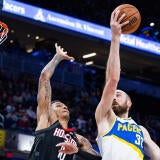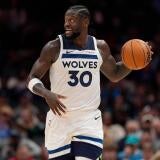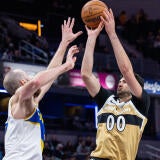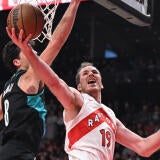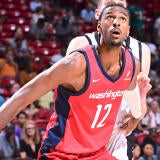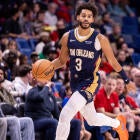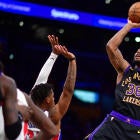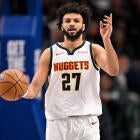Fantasy Basketball: What kind of impact can we expect from the 2019 class?
Is this year's rookie class filled with potential Fantasy difference makers? It might be better than you think.
With the 2019 NBA Draft behind us, it's time to dive into what really matters: Which of these players should you be targeting in Fantasy drafts next season?
The 2019 class has long been characterized as a top-heavy one, and that also rings true for Fantasy purposes. The top three picks in Thursday's draft could very easily be the top-three Fantasy commodities, though if past drafts have taught us anything, it's that value can, and almost certainly will, emerge from more unlikely sources.
Let's take a look at the rookies to monitor as free agency and the Las Vegas Summer League approach:
New-look Pelicans
We'll start at the top with what's suddenly one of the best -- if not the best -- collections of young talent in the NBA. Zion Williamson is the Pelicans' obvious centerpiece going forward, but he'll be flanked by the three ex-Lakers, as well as a steady veteran in Jrue Holiday. In addition to Williamson, the Pelicans also added Jaxson Hayes (8th overall) and Nickeil Alexander-Walker (17th) -- two depth pieces at positions of need.
Fantasy-wise, Williamson is the clear-cut No. 1 rookie. He'll take a step back in terms of efficiency after a record-setting freshman year at Duke, but even if Williamson goes through some growing pains, his rare combination of elite offensive and defensive production should more than keep his Fantasy value afloat. Williamson shot 68 percent from the floor at Duke on his way to 22.6 points per game. He also snatched 8.9 rebounds, while adding a combined 3.9 steals/blocks. The defensive numbers may not be sustainable against NBA competition, but Williamson could easily be a 1.5-block, 1.5-steal guy in Year 1.
Neither Hayes nor Alexander-Walker are likely to be Fantasy-relevant as rookies, though both carry some long-term upside and could be regular rotation players next season. New Orleans did pick up its option on Jahlil Okafor, but his role will likely be somewhat limited. Meanwhile, the selection of Alexander-Walker could foreshadow New Orleans moving on from free-agent-to-be Elfrid Payton. Another free agent, Julius Randle, also appears likely to head elsewhere this summer after quietly finishing last season as a top-20 per-game scorer.
Morant in Memphis
Like most rookie point guards, Morant will likely struggle to score efficiently, but the Murray State product will enter a near-ideal situation in Memphis, where he'll have a clear path to a significant workload from the jump. More importantly, the rebuilding Grizzlies will allow Morant to play through his mistakes.
With Mike Conley now in Utah, Morant will step in as the unquestioned starting point guard, and he projects to be an immediate source of scoring, assists, and made three-pointers. Morant rebounded well for his size in college (5.7 RPG), but it remains to be seen whether that will translate to the next level. The same goes for his defensive numbers (1.8 steals, 0.8 blocks), which will likely take a step back in the NBA.
Something else to keep an eye on in Memphis is the future of Delon Wright, a restricted free agent who came over from Toronto as part of the Marc Gasol trade. Before the Grizzlies jumped up to No. 2, bringing Wright back seemed like the sensible move, but with Morant in the mix, Wright becomes more expendable. With that said, the Grizzlies could move the 6-foot-5-inch Wright off the ball and pair him with Morant.
Barrett to the Knicks
I get the sense that I'm higher on Barrett than most, and I think he'll benefit from the spacing the NBA game brings. While I'd still rank him behind Williamson and Morant, there's a scenario in which Barrett is next season's most productive rookie -- at least on the offensive end. If the Knicks strike out in free agency, or add an injured Kevin Durant, Barrett could end up falling into a situation where he's the No. 1 or, at worst, No. 2 ball-handler.
What we know for sure is Barrett won't shy away from the spotlight, and though he'll likely go through some rough stretches, he's a candidate to lead all rookies in usage on what could be a very bad but very fun Knicks team. Barrett may not do anything at an elite level right now, but his combination of scoring, assists and rebounds at 6-foot-7 gives him a relatively high Fantasy floor, by rookie standards. The biggest questions he'll have to answer are whether he can limit turnovers and hike his three-point percentage closer to the mid-30s.
Darius Garland in Cleveland
Cleveland going with a point guard for the second straight draft wasn't exactly a ringing endorsement for Collin Sexton, who will likely spend considerably more time off the ball next season. Given Sexton's historically poor assist rate as a rookie, that might not be a bad thing. Defensively, the Garland-Sexton pairing could be disastrous, but Garland does carry some Fantasy intrigue as a late-round flyer. While the collegiate sample size is small, Garland projects to be a considerably more efficient scorer than Sexton, and it would be almost impossible for Garland not to top Sexton's rookie-year rebounding (2.9 RPG) and assists (3.0) contributions.
Other Rookies to Monitor
Coby White, Bulls: This is more about opportunity than anything else. Kris Dunn is still on the roster, but White is the future, and his selection could mean Dunn will be aggressively shopped this summer. White is probably a late-round flyer, at best, but he was a high-volume three-point threat at North Carolina (6.6 3PA/G; 35% 3PT) whose size (6-5) should enable him to rebound well at the next level.
De'Andre Hunter, Hawks: Atlanta moved up to get their target at No. 4, but Hunter projects to be a much better real-life player than Fantasy commodity. While Hunter should provide adequate rebounding and efficient three-point shooting, his high-level defense didn't translate to valuable steals/blocks numbers at the college level (combined 1.2 steals/blocks last season).
Jarrett Culver, Timberwolves: It's not exactly clear what Minnesota's intentions were after trading up to No. 6, but they ended up with an excellent value in Culver. Moving up cost the Timberwolves Dario Saric, but he never truly fit in after coming over from Philadelphia last season. With Robert Covington back healthy, Culver may not start in Minnesota, but he'll be a name to keep an eye on in deeper formats.
Rui Hachimura, Wizards: The No. 9 overall pick shouldn't be on your draft radar in standard leagues, but he does enter somewhat of an advantageous situation. The Wizards will likely remain in a holding pattern next season as they continue to be handcuffed by the John Wall contract. The return of Dwight Howard will bring much-needed frontcourt depth, but given Howard's injury history -- and the amount of uncertainty elsewhere in the frontcourt -- it wouldn't be a huge shock if Washington falls out of playoff contention and Hachimura eventually finds himself in a significant role as this year's Thomas Bryant.
Brandon Clarke, Grizzlies: Perhaps the best value of the draft, the 21st overall pick has some major questions to answer on the offensive end. However, if he's even half of the shot-blocker he was at Gonzaga last season (3.2 BPG), he could have a path to deep-league value as a single-category producer who rebounds well and shoots a high percentage.
Ty Jerome, Suns: Jerome is another guy who should not be drafted, but if the Suns somehow manage to strike out on adding a point guard for the 15th consecutive summer, Jerome could fall backwards into a sizeable role as a rookie. Heading into free agency, the other names on the depth chart -- Tyler Johnson, Elie Okobo, De'Anthony Melton -- are hardly entrenched.

